Human Flower Project
Rakhi: Binding Sister and Brother
At Hinduism’s festival of siblings, every brother deserves flowers at the wrist.
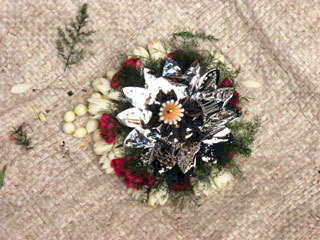
Sacred Rakhi bracelet, with fern and tuberose, handmade in Kolkata, India
Photo: Sandy Ao
Many thanks to Sandy Ao for touching, with beauty and ritual, a topic still beyond the reach of our ten-foot pole. Brothers and Sisters.
Full moon of the Hindu month of Shravan is the festival of Rakhi in India: August 5, this year. “Hindus over the world celebrate this day with deep love between brothers and sisters,” Sandy writes.
While this day occasions many sorts of gifts and blessings, the most traditional – and loveliest, we think—is the tying of a sacred Rakhi string. Customarily, a sister attaches the bracelet around her brother’s right wrist and prays for his safety and long life.
“Rakhis are ideally made of silk with gold and silver threads, beautifully crafted embroidered sequins, and studded with semi precious stones,” says one source. From her walks about Kolkata, Sandy discloses a far finer “ideal.”
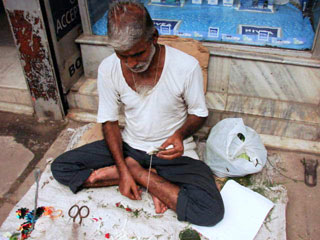 Making bracelets for the upcoming festival of Rakhi
Making bracelets for the upcoming festival of Rakhi
Photo: Sandy Ao
Sending us photographs of bracelets decorated with marble beads, yarn, straw flowers, and tiny plastic figurines, Sandy writes, “I found this man was making some fresh flowers Rakhi, too! I hope his idea of using fresh flowers for Rakhi will inspire others to follow.”
He appears to be stitching circles edged with tuberose blossoms and decorating them with mylar cutouts, strands of calotropis, ferns, and sequins, turning them into fresh-faux passion flowers. What emblems for the crazy power of sibling relationship!
“I have two younger brothers,” our friend writes. “I am very close to them from the beginning. I am especially close to my youngest brother. Sometimes I feel I simply adore him!!!” Both Sandy’s brothers live half a world away, in Canada.
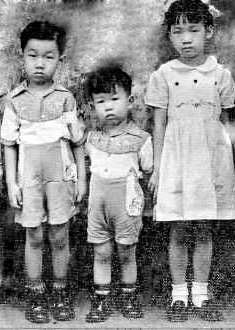 Sandy and her brothers (from left) Kee Sheong Wong and Yeon Sheong Wong
Sandy and her brothers (from left) Kee Sheong Wong and Yeon Sheong Wong
“The brother next to me left Kolkata 36 years ago,” she writes, and though brother and sister haven’t seen one another since, “the distance has not changed the love we share as siblings.”
She generously passed on further insights into family dynamics in her country:
“In India, the menfolk are very protective about their sisters. For instance, the men will not get married unless the sisters are married first!”
We do know of families in the U.S. where brothers have delayed marriage until after their sisters wed, but we always had assumed it was just that, on average, men tend to marry later in life than women do. It never occurred to us that brotherly protectiveness might be operating.
Sandy adds, “In my opinion, the men (of India) can take their wives for granted; they feel disappointed when a baby girl is born. However, when sisters are concerned, the men love their sisters with much tenderness. It is amazing, isn’t it?”
Indeed it is, Sandy.
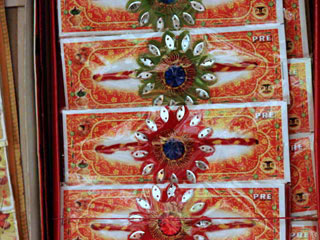 Rakhi bracelets, made in China, for sale in Kolkata
Rakhi bracelets, made in China, for sale in Kolkata
Photo: Sandy Ao
“Many a time, my mother will tell me that I am the best child amongst her six offspring… for I brought two good brothers with me!! It’s not that my mother loves the sons more than the daughters. I think what she means will be, she is proud of having two good human beings as her sons.”
Such honest pride is close to the source of all familial love. For in loving our parents, children and siblings, we are richly loyal and richly vain—aren’t we secretly adoring ourselves?
Having come along as the only daughter, after three sons, our circumstance felt somewhat different from what Sandy describes. Doted on and picked on, cherished, dismissed, we felt always underfoot as three clashing mythical figures – distinct as the Scarecrow, Tin Man, and Cowardly Lion – shaped our upbringing.
“I feel that the love between the siblings never really gets diluted,” writes Sandy. “It is just that we are so engrossed with our daily chaos, and not able to take time out for our siblings.”
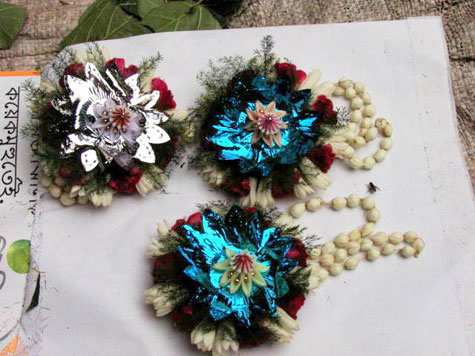
Handmade “passionflowers” will be worn by some lucky brother on the festival of rakhi, celebrated this year on August 5
Photo: Sandy Ao
After a lifetime as “little sister,” we’re now in our mid-50s and have caught up with our fraternal giants. Almost. How we would enjoy tying sparkling tuberose bracelets on the wrists of our two surviving brothers, wishing them—and our brother lost, too – protection again evil.
Thank you, Sandy. Best wishes to you and your brothers.
And our love to Peter, Phil and Joe.
Comments
Hey, Julie—
Lovely piece. I was happy to learn of that Hindu ritual between brother and sister—and all the rest.
I saw my sister for a few days in Louisville last month. She let Nora wear her jangly bracelets, and also painted Nora’s toenail and fingernails with the reddest red.
I also saw Allen B for a couple of hours. I’m looking forward to his E. Lawrence piece.
Well, I see I’m going far afield (or farther afield) here. I’ll write you an email one of these days. Keep up the good work.
Dwight
I would love to give my brother a Rakhi but we are not Hindu. Like Sandy, “I will take this post as my Rakhi” for him.
Thank you Sandy and Julie.
The origin of the Rakhi festival is cultural rather than religious. The story goes that Karnavati, the widowed queen of Chittor had sent a rakhi to Humayun, the Moghul king, seeking his help against Bahadur Shah, the king of Gujarat, who had besieged Chittor and King Humaun had rushed to her help immediately.
Thus, one can tie a Rakhi around anyone, not just a real brother, he then becomes your brother. Of course to keep unwanted suitors at bay, in India, girls tie Rakhi’s around their wrists, a polite way of telling them that they do not have any romantic feelings for them.
The “flower rakhis” were so cool. Thanks for sharing.
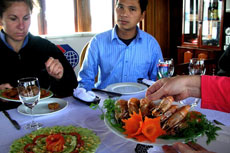

Oh, Julie,
You brought tears in my eyes…
Only you can bring out such loving feeling between brothers and sisters in us.
I miss my brothers more than any other time after reading your tender,loving post…
As we are non Hindu I am unable to tie a Rakhi string on my brothers’ wrists… but I will take this post as my Rakhi for them…
Surely you are luckier than I, you have three brothers standing there all the time for their little sister…
I must mention that you are like W.Somerset Maugham, so gifted and powerful in understanding the human feelings…
Thank you so much my dearest friend..